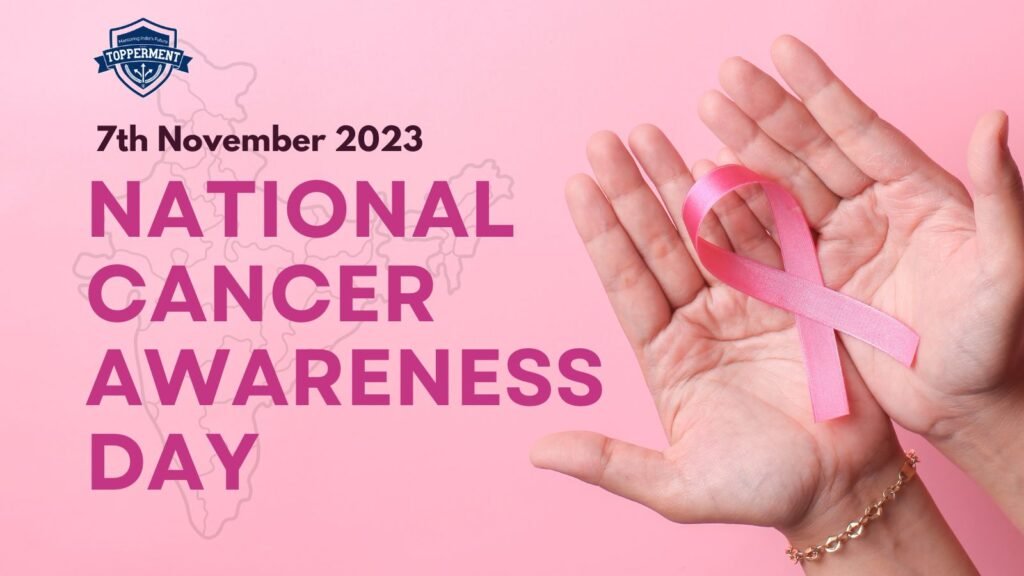National Cancer Awareness Day is observed on November 7 every year in India. The day aims to spread awareness about the prevention, detection, and treatment of cancer, which is one of the leading causes of death in the country. According to the World Health Organization, India had nearly 1.1 million new cancer cases and 7.8 lakh cancer deaths in 2020
In this blog post, we will discuss the history and significance of National Cancer Awareness Day, the common types and symptoms of cancer, and the ways to reduce the risk of cancer.
History and Significance of National Cancer Awareness Day
National Cancer Awareness Day was first announced by the Union Health Minister Dr. Harsh Vardhan in September 2014, to coincide with the birth anniversary of Marie Curie, the Nobel Prize-winning scientist who discovered radium and polonium, and contributed to the development of radiotherapy for cancer treatment
The main objective of the day is to educate the public about the importance of early detection and diagnosis of cancer, which can improve the chances of survival and reduce the cost of treatment. The day also encourages people to adopt healthy lifestyles and avoid tobacco and alcohol consumption, which are major risk factors for cancer
The National Cancer Control Programme, which was initiated in 1975, provides cancer treatment facilities and screening services in various government and municipal hospitals and clinics across the country. The programme also supports research and training on cancer prevention and control.
Common Types and Symptoms of Cancer
Cancer is a disease that occurs when abnormal cells grow and divide uncontrollably, forming tumors that can invade and damage other tissues and organs. There are more than 100 types of cancer, but some of the most common ones in India are:
- Breast cancer: It affects the breast tissue and is the most common cancer among women in India. It can cause symptoms such as a lump or swelling in the breast, nipple discharge, skin changes, or pain.
- Oral cancer: It affects the mouth, tongue, lips, gums, or throat and is the most common cancer among men in India. It is mainly caused by tobacco use and can cause symptoms such as a sore or ulcer in the mouth, difficulty in swallowing, bleeding, or pain.
- Lung cancer: It affects the lungs and is the second most common cancer among men in India. It is mainly caused by smoking and exposure to air pollution and can cause symptoms such as a persistent cough, chest pain, shortness of breath, or blood in the sputum.
- Cervical cancer: It affects the cervix, which is the lower part of the uterus, and is the second most common cancer among women in India. It is mainly caused by human papillomavirus (HPV) infection and can cause symptoms such as abnormal vaginal bleeding, discharge, or pain.
- Stomach cancer: It affects the stomach and is the third most common cancer among men in India. It is mainly caused by Helicobacter pylori infection, dietary factors, or genetic factors and can cause symptoms such as indigestion, nausea, vomiting, weight loss, or pain.
Other common types of cancer in India include colorectal cancer, prostate cancer, liver cancer, ovarian cancer, and leukemia.
The symptoms of cancer may vary depending on the type, location, and stage of the disease. Some cancers may not cause any symptoms until they are advanced and spread to other parts of the body. Therefore, it is important to consult a doctor if you notice any unusual or persistent changes in your body.
Ways to Reduce the Risk of Cancer
While some factors that increase the risk of cancer, such as age, family history, or genetic mutations, are not modifiable, there are many lifestyle choices that can help prevent or lower the risk of cancer. Some of the ways to reduce the risk of cancer are:
- Avoid tobacco use: Tobacco use, whether smoking or chewing, is the single most preventable cause of cancer. Tobacco contains more than 7,000 chemicals, many of which are carcinogenic, meaning they can cause cancer. Tobacco use can cause cancer of the lung, oral cavity, larynx, esophagus, bladder, kidney, pancreas, cervix, and more. Quitting tobacco can reduce the risk of cancer and improve the overall health and quality of life.
- Limit alcohol consumption: Alcohol consumption can increase the risk of cancer of the mouth, throat, esophagus, liver, colon, breast, and more. Alcohol can damage the DNA of the cells, interfere with the metabolism of other carcinogens, and increase the levels of estrogen, a hormone that can promote the growth of some cancers. Limiting alcohol consumption to no more than one drink per day for women and two drinks per day for men can reduce the risk of cancer.
- Maintain a healthy weight: Being overweight or obese can increase the risk of cancer of the breast, colon, rectum, esophagus, kidney, pancreas, gallbladder, endometrium, and more. Excess body fat can cause chronic inflammation, alter the levels of hormones and growth factors, and impair the immune system, all of which can contribute to the development of cancer. Maintaining a healthy weight within the normal range of body mass index (BMI) can reduce the risk of cancer and other chronic diseases.
- Eat a balanced diet: Eating a balanced diet that is rich in fruits, vegetables, whole grains, legumes, nuts, and seeds can provide various nutrients, antioxidants, and phytochemicals that can protect against cancer. These foods can help prevent oxidative stress, inflammation, and DNA damage, and modulate the immune system and the expression of genes involved in cancer. Eating a balanced diet can also help prevent obesity, which is a risk factor for cancer. On the other hand, eating a diet that is high in red meat, processed meat, salt, sugar, and fat can increase the risk of cancer of the colon, stomach, pancreas, and more. These foods can cause chronic inflammation, oxidative stress, and DNA damage, and alter the gut microbiota, which can affect the metabolism of carcinogens. Eating a balanced diet can also help prevent obesity, which is a risk factor for cancer.
- Be physically active: Being physically active can reduce the risk of cancer of the colon, breast, endometrium, and more. Physical activity can help prevent obesity, which is a risk factor for cancer. Physical activity can also lower the levels of hormones and growth factors, improve the insulin sensitivity, enhance the immune function, and modulate the gut microbiota, all of which can influence the development of cancer. Being physically active can also improve the mental and emotional well-being and reduce the stress levels, which can affect the risk of cancer. The World Health Organization recommends at least 150 minutes of moderate-intensity or 75 minutes of vigorous-intensity physical activity per week for adults.
- Protect yourself from the sun: Exposure to ultraviolet (UV) radiation from the sun or artificial sources, such as tanning beds, can increase the risk of skin cancer, such as melanoma, basal cell carcinoma, and squamous cell carcinoma. UV radiation can damage the DNA of the skin cells and cause mutations that can lead to cancer. Protecting yourself from the sun can reduce the risk of skin cancer and prevent premature aging and other skin problems. Some of the ways to protect yourself from the sun are:
- Avoid sun exposure during the peak hours of 10 a.m. to 4 p.m., when the UV rays are the strongest.
- Wear protective clothing, such as long-sleeved shirts, pants, hats, and sunglasses, when going outdoors.
- Apply a broad-spectrum sunscreen with a sun protection factor (SPF) of at least 15, and reapply it every two hours or more often if sweating or swimming.
- Seek shade or use an umbrella when possible.
- Avoid using tanning beds or lamps, which emit UV radiation that can cause skin cancer.
- Get vaccinated: Some cancers are caused by infections with certain viruses or bacteria, such as human papillomavirus (HPV), hepatitis B virus (HBV), hepatitis C virus (HCV), Helicobacter pylori, and more. These infections can cause chronic inflammation, immune suppression, and DNA damage, and interfere with the normal cell cycle and apoptosis, which can result in cancer
Conclusion
National Cancer Awareness Day is a day to raise awareness about the prevention, detection, and treatment of cancer, which is a major public health problem in India. By following a healthy lifestyle, getting vaccinated, and getting screened, we can reduce the risk of cancer and improve the chances of survival and recovery.
We can also support the efforts of the government, the health care providers, the researchers, and the civil society organizations, who are working to improve the cancer care and control in the country. Together, we can fight cancer and save lives.
Also Read
- Plant Biotechnology: Revolutionizing Agriculture for a Sustainable Future | UPSC Science And Technology
- Plateau Formation Process And Its Significance | UPSC Geography
Follow Us For More Content On:
https://www.instagram.com/topperment/


